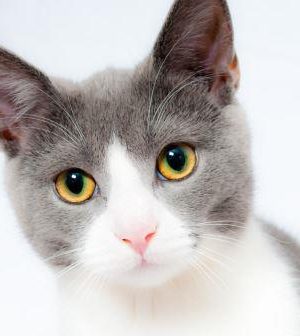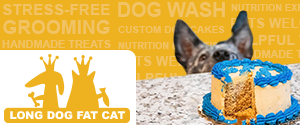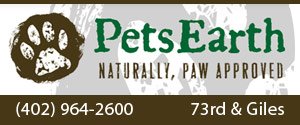- Do you subscribe to Dharma Dog Training’s Newsletter? You should.
- A Unique Campaign from The Humane Society of the United States
- Rabid bats in Omaha- Stay safe, prepared with these tips
- Springtime Activities in Omaha
- Mill Dog Monthly from Bailing Out Benji
- World Spay Day, Legislative Alert in Nebraska
- Attend the Nebraska Rescue Council’s monthly meeting this Saturday
- Five Hard-to-Ignore Reasons to Adopt!
- Paws in Pink to Benefit Breast Cancer Foundation
- VCA, Inc. Acquires MidWest Vet Specialists from Kansas State University
Is Your Diet Triggering Your Cat Allergy?

To put it in the simplest way possible, an allergy to anything occurs when your immune system detects something as a pathogen falsely, and goes crazy by producing excess nitrogenous compounds (which are essential in normal quantities) known as histamines. These cause a variety of symptoms which range from mild rashes, sneezing and itching, to severe inflammation of the trachea and the skin that could potentially lead to loss of life via asphyxiation, also known as death due to anaphylactic shock. Now, this is bad news if you love cats and you are allergic to them at the same time!
Are Antihistamines a Solution?
While antihistamines can help keep the allergy at bay, they do have a range of side effects, especially when used daily for a long stretch of time. There is actually a better way to minimize your pet allergies by controlling only your diet that we are going to get into later on.
Can Certain Foods Make Your Pet Allergy Worse?
It may not seem like it, but know that the intake of any food which either has a high histamine content or induces an allergic reaction in an individual, will cause that person to experience elevated symptoms of their pet allergy as a result.
Sometimes, even if you did not have cat allergies before, a constant intake of high-histamine foods can lead to the development of new kinds of allergies as well. While there is no guarantee of the risks associated with a person developing specifically cat allergies after any kind of diet in particular, all your allergies in general are going to get worse if you do not consider changing to an anti-histamine diet.
What is an Antihistamine Diet?
An antihistamine diet, by its very definition, is a kind of diet that is designed to avoid foods which people are known to have allergic reactions to, but without sacrificing on the essential nutrients necessary for us to stay healthy.
Some of the most common histamine-rich foods are pork, poultry, nuts, soy sauce, vinegar, shellfish and even alcohol. Unfortunately, it is very difficult to prepare a diet that is truly effective because everything from how the food in question was prepared, to what was added in it while cooking can play a part in increasing or decreasing the allergenic nature of a food item.
How Do You Adopt an Antihistamine Diet that is Effective?
If you consider changing to an anti-histamine diet, it doesn’t have to be so difficult for you though, because Vitamonk has made that process easier by providing each and every bit of information backed by scientific facts on their webpage linked above.
Not only do they list each and every food item which you might need to avoid while following such a diet, they actually go to great lengths in providing you with healthy alternatives that can replace the histamine-rich foods. Do visit the page because there is a lot of information there that might finally help you pet your cat without the sneezes!
To conclude, we would have to say that the answer is yes, your diet can and possibly is making your cat allergy worse than it actually is. Once the histamine production is boosted and the immune system starts to go haywire, it requires time, medication and an antihistamine diet to calm down again. If at that time, it continues to receive the same histamine-rich food on a daily basis, your immune system could become permanently aggressive to all things that it considers as a pathogen. This can lead to new allergies and a worsening of allergic reactions that were there from the beginning.
Latest News
-
How to Make Your Rescue Pet as Comfortable as Possible
Did you bring home a new pet from a shelter...
- Posted 2 weeks ago
- 0
-
How Having A Pet Can Change Your Life
Having a pet can open your heart in ways that...
- Posted 6 months ago
- 0
-
How To Improve The Life Of Your Senior Pet
Do you have an elderly fur baby and want to...
- Posted 6 months ago
- 0
-
Springtime Activities To Enjoy With Your Furry Friends
Are you preparing for warmer weather and want some ideas...
- Posted 7 months ago
- 0
-
Pros And Cons Of Microchipping Your Pets
Have you considered whether your pets should be microchipped and...
- Posted 8 months ago
- 0
-
The Best New Fun Toys For Dogs And Cats
The Best New Fun Toys For Dogs And Cats Did...
- Posted 8 months ago
- 0
-
Heartfelt Ways To Show Your Pet You Love Them
Did you know there are more ways to show your...
- Posted 9 months ago
- 0


















You must be logged in to post a comment Login